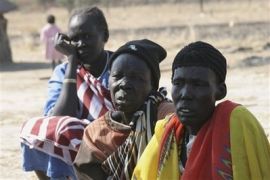Sudan refuses six-weeks delay to settle Abyei issue
October 31, 2012 (KHARTOUM) — Sudanese Vice-President announced the rejection of a decision by the African Union Peace and Security Council (AUPSC) calling to settle the conflict during six weeks or to refer a proposal of the mediation to the Security Council if they fail to reach a compromise.

Sudan had refused the proposal made the African Union mediation on 21 September but the AUPSC however decided to approve it as “final and binding”, and to seek its endorsement by the Security Council if the parties fail to reach a solution within six weeks.
Foreign minister Ali Karti, spoke on Tuesday about an attempt by the United States and some European countries to force the African body to refer it directly to the Security Council. He further accused Abyei’s sons of being behind the move.
Speaking after an extraordinary meeting held at the NCP premises in the capital to discuss Abyei issue, Al-Haj said that his party is willing to negotiate Abyei issue on the basis of the signed agreement but will not commit to the proposal made by the mediation even after the expiration of six-week period.
“If we do not reach an agreement (during the six weeks) we will not commit to that proposal which we already rejected,” said the Sudanese Vice-president who reiterated Sudan’s commitment to all agreements signed with the South Sudan.
Sudanese officials in the past weeks expressed their support to a previous proposal providing to divide the disputed region between the two countries but it was rejected by the South Sudanese government.
The decision might threaten the implementation of the agreements signed on 27 September including oil exportation and security arrangement as well as trade border.
It also would create a new tension in the already strained relation with the international cimmunity.
Khartoum, nonetheless, has already decided to left the trade embargo and opened the traffic between the two countries.
The rejection of AUPSC decision also coincided on Wednesday with the publication of a presidential decree providing to form The High Follow-Up Committee for the Implementation of Cooperation Agreement between Sudan and South Sudan.
The committee will be chaired by President Omer Al-Bashir himself while First Vice President Ali Osman is appointed as deputy chairman. On the other hand, Presidential assistant Nafie Ali Nafie, is appointed rapporteur of the panel and state minister Idris Abdel Al-Gadir who led Sudanese negotiating team in Addis Ababa talks, is the deputy rapporteur.
Since 2005, the two countries failed to agree over the participation of the nomads of Misseriya tribe who pass several months every year for grazing in Abyei but also speak about ancestral rights in the region.
Sudan and South Sudan also failed to agree on the demarcation of border as the two countries claim the ownership of some areas on the common border.
The two parties during Naivasha talks agreed that Sudan’s border maps of 1956 should serve as criteria on the demarcation process but Abyei, with its protocol, remained an exception in this agreement as the parties opted for the tribal criterion to settle the issue.
However, on both cases – illustrated by 14 mille and Abyei – the parties still need to find common ground satisfying local leaders.
(ST)
